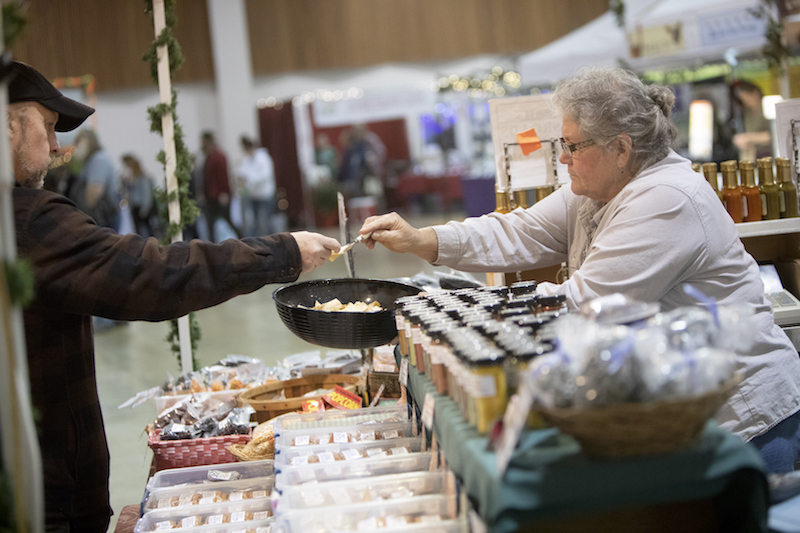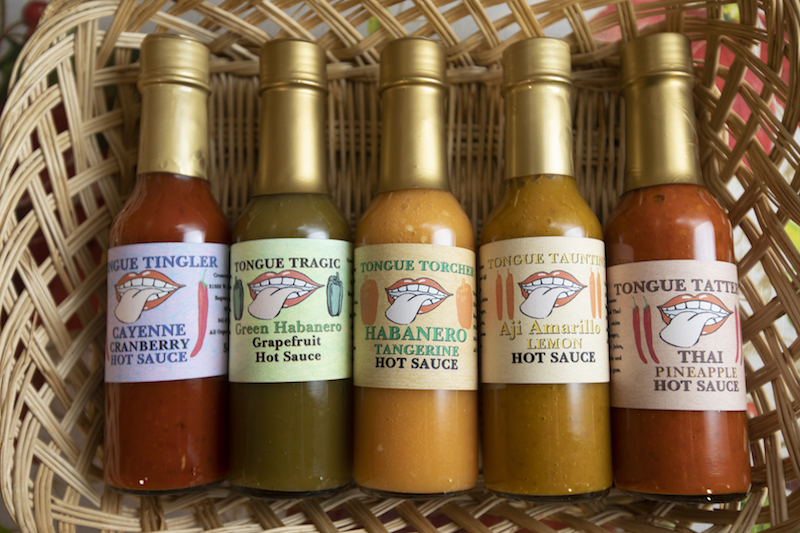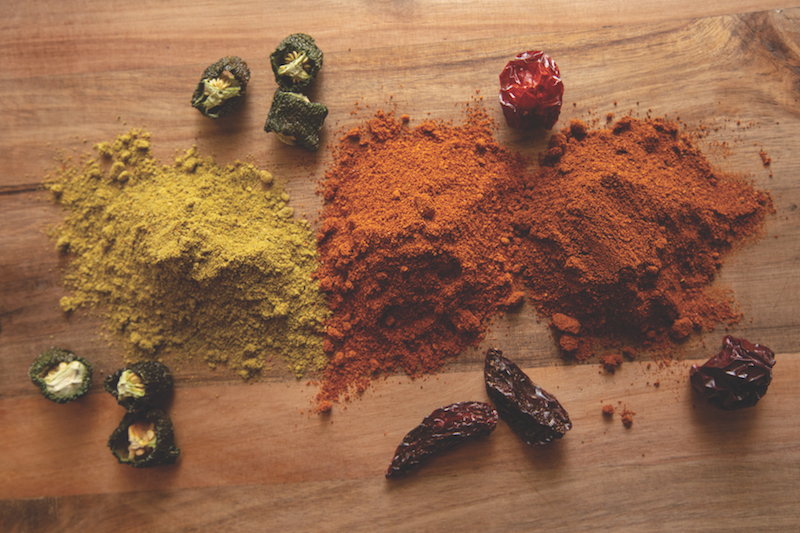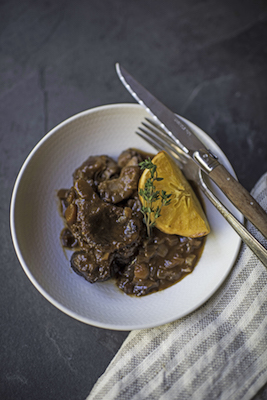written by Sophia McDonald | photography by Amanda Loman
Chili peppers have long been considered an aphrodisiac. The theory goes that the capsaicin, or spicy compound, in these colorful vegetables triggers a release of endorphins as it hits the tongue. That
Oregon-grown hot peppers aren’t available in stores or farmers markets around Valentine’s Day, but those lucky enough to have stocked up on chili powders and fermented hot sauces from Crossroads Farm near Eugene can still get their spicy fix. Debbie Tilley, who operates the 25-acre organic farm with her husband, Ben, has been producing value-added goods for decades. She used to specialize in dried flower arrangements and ornamental produce, including strings of chilis similar to the
Tilley had always been attracted to warm-weather crops such as peppers and tomatoes. “Everyone said peppers couldn’t be grown in the Willamette Valley because it was too short of a growing season, but I’d already been doing it,” she said. “Fifty to 90 degrees is the ideal growing condition in my view. They may not be as hot as the ones that come from the Southwest, because that’s a real hot, dry climate.” Still, she suspected she could make a viable business with them.

Debbie Tilley, who runs Crossroads Farm with husband Ben, hands out samples of a dip created using the homegrown peppers at the farm’s stall at the Eugene Holiday Market on Sunday, November 25. 
Crossroads Farm grows and sells peppers and pepper products including a line of fermented hot sauces.
She also knew that growing food for the fresh market wouldn’t be enough to keep the farm profitable. “To make it as a small farmer you’ve basically got to do something with your product that extends your season,” she said. “That’s the value-added product side of it. I had all these peppers, and I didn’t want anything to go to waste. I started drying them because I had already perfected drying stuff with my dried flowers. It wasn’t that hard to convert over to drying peppers.”
Ben Tilley smokes the peppers before they’re dehydrated, ground and bottled. Tilley sells between sixteen and eighteen chili powders, including paprika, cayenne, chipotle and guajillo. She also carries some whole dried chilis.
She credits their sons, Ben Jr. and Nathan, with the idea for the hot sauces. They own Agrarian Ales, a popular farmhouse brewery located on the property. Their experience with fermenting led her to try similar techniques on hot sauces. She now sells as many as thirteen varieties. “Even though I grow all the hot stuff, I don’t really like hot food that much,” she said. Her favorite sauce is the mild jalapeño lime, which she uses on quesadillas, tacos, chile
Tilley’s products are available exclusively at the Lane County Farmers Market and Eugene Holiday Market. In March and April, she sells pepper seedlings in addition to the chili powders and hot sauces. They sustain her through June and
Through late summer and into fall, the enticing smell of roasted peppers permeates Tilley’s end of the farmers market. Every weekend, Ben Tilley fire-roasts poblano, Anaheim and other chilis in a rotating basket set over an open flame. The charred peppers are bagged, then frozen or sold immediately to drooling customers.
The southern Willamette Valley’s pepper season can last into November now. Climate change has pushed Tilley’s average frost date from mid-October to nearly Thanksgiving. With the value-added products, her sales last until the holiday season in December. Th
In 2011, Oregon passed the Farm Direct Marketing Law, which made it easier for small operations like Crossroads Farm to create value-added products from their produce. This practice has many benefits for growers and communities. “It allows for these diversified income streams,” said Dr. Lauren Gwin, associate director of the Center for Small Farms and Community Food Systems at Oregon State University. “It creates new types of products you can sell that bring in new customers.
It allows for season extension. We’ve talked to farmers who, in the early part of the season, don’t have a lot of fresh product to put on the tables at farmers markets. But if they have value-added products, they can put those on the table, and it fills in the booth and draws people in.” Creating value-added products gives existing farm employees something to do during the slow season and can even create new jobs, should those small businesses decide to scale up.

Tilley’s value-added products or fresh peppers can be used to craft a delicious Valentine’s Day dinner. Cebiche “cinco elementos,” a hot and cold appetizer from Doris Platt-Rodriquez, co-owner of Portland’s Andina, calls for a Peruvian pepper called ají limo. Habanero peppers make a decent substitute.
Another option for the main part of the meal is mini bacon-wrapped meatloaf with harissa barbecue sauce. James Fink, chef-owner of Wild Oregon Foods in Bend, recommends shaping each meatloaf like a heart for a romantic touch.
No Valentine’s Day is complete without a chocolate dessert. Ally Fortin, pastry chef for Irving Street Kitchen in Portland, shares a recipe for Mexican hot chocolate cake with a healthy spoonful of cayenne pepper.
Oregon Recipes: Spice Up 2019
Mexican Hot Chocolate Cake
Irving Street Kitchen / Portland Ally Fortin
YIELDS ONE BUNDT PAN
2 cups plus 2 tablespoons all-purpose flour
2 cups plus 3 tablespoons granulated sugar
1 1/4 cups cocoa powder
1 tablespoon plus 1 teaspoon baking soda
2 teaspoons baking powder
1 teaspoon salt
2 teaspoons cayenne pepper
2 teaspoons cinnamon
2 eggs
1/2 cup coffee
1 cup milk
1/2 cup canola oil
1/2 ounce vanilla extract
Generously spray a bundt pan with cooking oil and preheat oven to 350 degrees. In a medium-size bowl, whisk together the dry ingredients and set the bowl aside. In a large bowl, whisk together all wet ingredients and set the bowl aside. Carefully mix the wet and dry ingredients, but be careful not to overmix. Pour the mixture into a bundt pan and bake for about 45 minutes to an hour, or until the cake springs back to the touch and a wooden skewer comes out clean.
Cebiche De Pescado Cinco Elementos
Andina / PORTLAND
Doris Platt-Rodriquez SERVES 4
1 pound fresh white fish with firm meat such as ono, sea bass, grouper or red snapper
1 small red onion, cored and sliced into julienne strips
1 cup lime juice
1 aji limo (lemon drop pepper), seeded, rinsed in cold water and julienned
1/4 cup julienned fresh cilantro leaves
Salt to taste
1 ear fresh corn on the cob, husked and boiled for 2 minutes
1 yam, boiled until tender when pierced, peeled
4 fresh butter lettuce leaves, rinsed and dried
1 yam, boiled until tender when pierced, peeled
4 fresh butter lettuce leaves, rinsed and dried
Cut the fish
Mini Meatloafs with Harissa BBQ Sauce
Wild Oregon Foods / BEND
SERVES 8
4 pieces Hill’s Bacon, par-cooked 4 minutes, cooled and cut in half
1 pound Rickety Bridge Ranch ground beef
1/2 carrot, brunoise
1/2 celery, brunoise
1 tablespoon sea salt
1/4 cup rice panko
1 egg, beaten
2 tablespoons Mt. Hood seasoning from Savory Spice Shop
FOR HARISSA BBQ SAUCE
15 dried
2 dried guajillo chiles, break and remove seeds/stems
1 dried ancho chili, break and remove seeds/stems
1 tablespoon cumin seeds, toasted
1
2 tablespoons lemon juice
1 tablespoon white wine vinegar
1 tablespoon tomato paste
1
1 teaspoon kosher salt
1/2 cup olive oil
1 cup Portland ketchup
Set bacon aside, then mix all other ingredients together with your hands. Portion meatloaf into 2-ounce
FOR HARISSA BBQ SAUCE
Place chiles in large mixing bowl and pour boiling water over top. Cover with plastic and let sit at least 30 minutes until soft. Drain, reserving 1/2 cup liquid. Wear disposable gloves if you like—the oil on the dried chiles will stay on your hands for a long time after processing.
Toast cumin and coriander seeds in a sauté pan over medium heat until you can smell them, about 2-3 minutes. Place seeds and garlic in a food processor and pulse until a paste forms. Add chiles and pulse again until a paste forms. Add lemon, vinegar, tomato paste, paprika and salt. Process until almost smooth. With the processor running slowly add olive oil and blend until incorporated. Add ketchup and blend. Cover and refrigerate.









